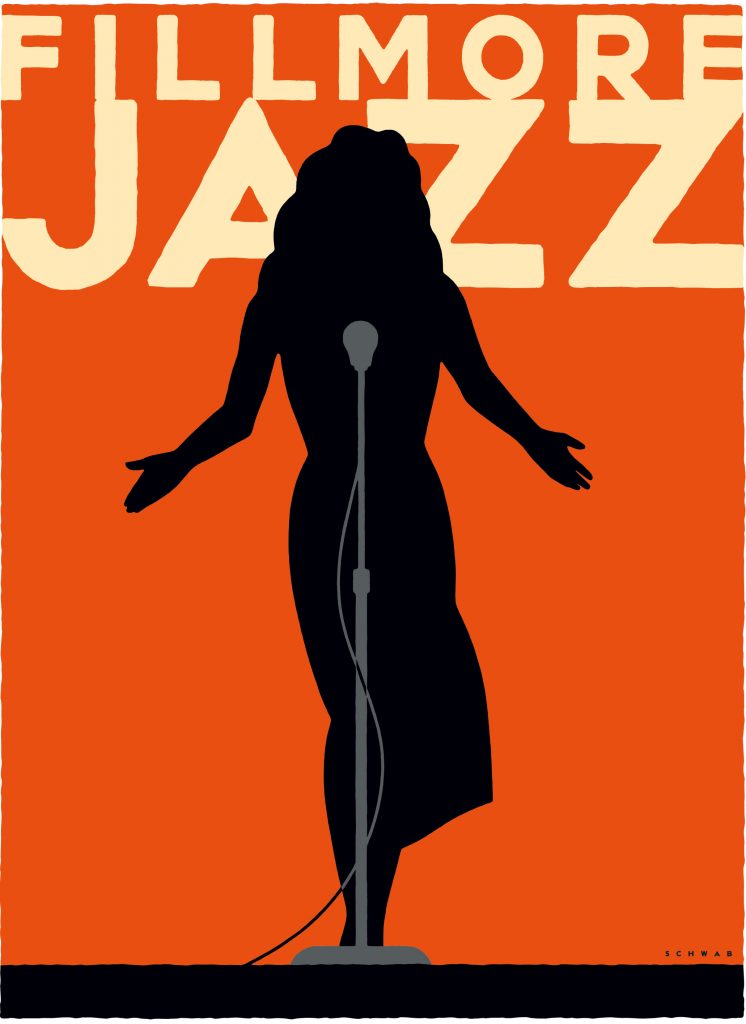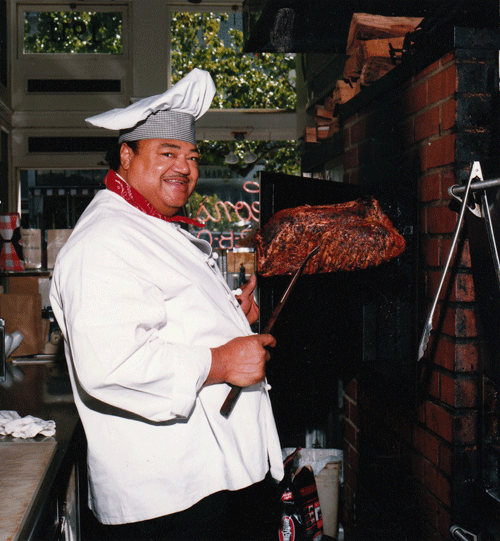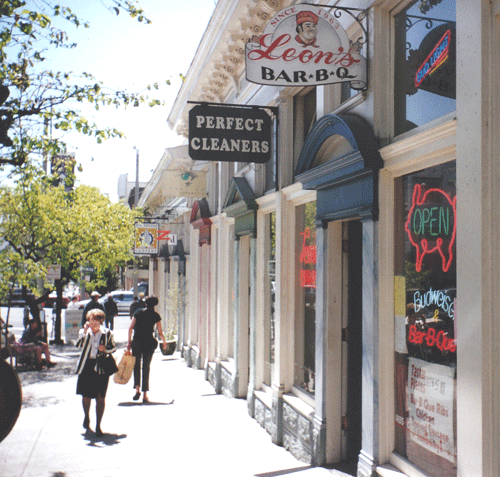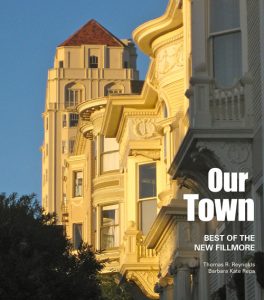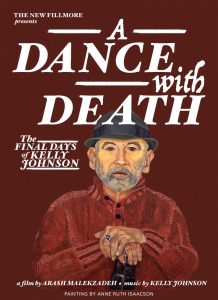By LESLIE HARLIB
Barbecue. You think juicy, hot, earthy, succulent. Barbecue is food of the people, American regional cooking that reflects the personality of the chef.
Consider the success of Leon McHenry, who became famous for barbecue, and whose special bottled sauces were still in grocery stores throughout the Bay Area long after his death in 1999.
One of the few merchants to survive the transition from the old Fillmore to the newer, gentrified neighborhood, Leon beefed up a solid following in the many years he had his doors open at 1911 Fillmore Street. That’s one reason he was able to stay in business when the other barbecue joints that used to pepper the street had long since closed.
From the March 1987 issue of The New Fillmore:
In talking to Leon McHenry, you quickly understand why the man has employees working for him for 10 years and meat distributors dealing with him steadily for 20 years. Leon is one of the calmer restaurateurs I’ve ever met. On the day I interviewed him, a man was waiting to see him when a teenage girl burst into the shop with some urgency, also needing his time. In a gentle, soothing way he made it clear he would be free as soon as possible. I got his full and complete attention until the interview was concluded.
Everyone gets treated like that. Leon, quite simply, is a man who cares. This comes through in the relaxed way he sits across the table, massive arms hanging at his sides, a mellow chocolate moon of a face, his black eyes looking at me directly and occasionally crinkling with humor.
Though he achieved success as a San Francisco landmark, he was born and raised in Tulsa, Oklahoma. “My father and mother were in the nightclub business in Tulsa,” he said. “They served barbecue and fried chicken. And Dad was a politician as well as a businessman. He used to give big rallies with barbecues where we’d roast a whole cow, goat and pig, rotating them around. Everybody loved it. I guess that’s where I first got a love for barbecue.”
“And the atmosphere — well, everyone’s having such a good time. You start to think about barbecue and you think about good times.”
McHenry moved to San Francisco in 1959, cooking among other places at the Seal Rock Inn near the Cliff House. But he wanted a restaurant of his own.
“I figured, after standing over a hot grill for 15 years, cooking pancakes and omelets, that barbecue would be easier,” he said. “I used to go down to a little barbecue joint on Market Street that was busy all the time. It seemed so popular, I figured barbecue would be a good choice.”
He opened his first location in 1972 on Sloat Boulevard, across from the San Francisco Zoo. Aided by his wife Vernetta, who worked with him to devise just the right barbecue sauce, the Sloat location became popular in short order. The Fillmore Street restaurant opened in 1977.
Keeping the stores going means 12- to 16-hour working days for Leon, who generally arrives at the Fillmore store around 8 a.m. to set up, get the brick ovens going, and put the meat in so it will be ready by lunchtime.
“You have to start early because barbecue needs to cook a long time — real slow cooking so the meat is tender and the fat drips off,” he said. “I cook my beef and pork ribs and chicken in the brick oven. The sauce goes on when they’re ready to be eaten. For cooking, there’s just some seasoning like pepper, paprika, a little onion flavoring. And I like to vary the wood. I’ll use mesquite or charcoal or fruitwood like apricot, peach or cherry wood. Depends on my mood.”
“One thing that’s kept my interest in barbecue is that it’s such a personal food,” he said. “You devise it the way you like it. Each place would have its own sauce. It’s part of the appeal — no two taste the same. My sauce is a hit, I guess, because I’ve had so many requests for it. I started to bottle it and now I’m selling it in Safeway and Petrini’s. All these years developing, and in the last year it’s finally taking off.”
One of Leon’s most colorful employees on Fillmore is a 66-year-old German lady named Ruth. Some customers find her a bit acerbic — they come in for ribs, and they get grilled.
“People come in with an attitude,” Leon said. “If anyone gives Ruth a hard time, she gives one back. But really, she’s the sweetest, nicest person. Some of the regulars holler, ‘Hey, Momma.’ ”
Once Leon figured he was onto a good thing with barbecue, he kept his menu pretty basic all these years. Pork ribs are the most popular item. You can also have barbecue beef, chicken, hot links or beef ribs. With a meal at Leon’s, you get meat with a corn muffin and a choice of sides.
“They say Fillmore’s becoming another Union Street, and the rents are going sky-high,” he said. “It’s certainly changed since I started here. When I opened, it was 20 cents a square foot to rent, and they were having trouble renting out all the stores on my block. I got a 10-year lease. Then it became 45 cents a square foot. Once the neighborhood began changing, around 1982, and my landlord changed as well, rents quadrupled.”
“What can you do?” he asked philosophically. “You have to keep your product as good as you can, make sure it’s personal and everything is done right. Then you’ve got your following and you hope they keep coming back. If you keep your doors open, you must be doing something right.”

Just the right sauce
WHEN Leon McHenry opened his first barbecue restaurant on Sloat Avenue in 1973, he began buying meat from a young salesman from Armour Foods named Terry Keenan.
Within a few years, he teamed up with Keenan to open Leon’s BBQ on Fillmore.
“I loved his products,” said Keenan. “The ribs were delicious and the sauce was fantastic.” So when they spotted a corner space on Fillmore Street and Wilmot Alley, they cleaned it up and opened a second location.
“Oh boy,” Keenan said in 2009. “The dividing line was California Street. South of California was the Wild West in those days.”
The restaurant took off, and Leon bought out his partner a couple of years later. Just about that time the building was renovated and the rent went up. Leon downsized into the space next door, now home of the restaurant SPQR.
A new partnership between the two friends began a few years after that when Keenan took Leon’s barbecue sauce and hot links to market and began selling them in grocery stores throughout Northern California. They were still available a decade after Leon died in 1999.
“The sauce is still exactly the same,” Keenan said. “I think Leon would be pleased.”


